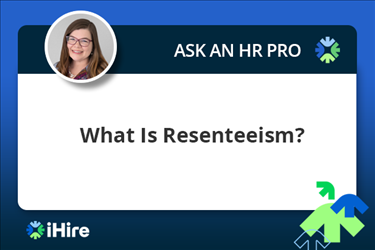- Employer Resources
- |
- Last Updated: February 08, 2023

How to Use Stay Interviews to Improve Employee Retention
While employers of the past have tiptoed around the idea of their employees leaving, savvy managers don’t wait for the exit interview to ask the important questions. They’re using stay interviews to improve employee retention.
What is a stay interview?
The stay interview is a structured conversation with your current team members to learn more about what they need to have job satisfaction. With this insight, you can proactively address concerns and implement strategies for nurturing your most valuable employees.

The Stay Interview | Key Benefits
A strong retention plan will boost team engagement and reduce your turnover rate, and stay interviews can be a powerful component of your plan. Here’s why managers use stay interviews to improve employee retention:
It takes the guesswork out of your retention plan. If you don’t conduct stay interviews, you may use exit interviews or engagement surveys to guide your retention efforts. Exit interviews are critical to understanding why your employees have left the company, but by the time you’re receiving the insights, it’s too late. While engagement surveys are more proactive, they’re often anonymous and don’t allow for an open dialogue. Stay interviews, on the other hand, give you the opportunity to dig deeper to better understand each team member so that you can build a well-informed, individualized retention plan.
It makes you a better delegator. During your stay interviews, you’ll learn more about your team members on a personal level. This will give you better direction when you’re breaking up tasks. For example, if Anna tells you one of her professional goals is to manage others, then you may let her take the lead with your summer intern.
It encourages open communication and builds trust. Many employees are afraid to speak up about their concerns or desires in fear that it will jeopardize their job or their relationship with their manager. By the time you hear about them in an exit interview, they’ve already accepted an offer outside of the company. The stay interview gives your employees the opportunity to speak honestly and allows you to address their thoughts and concerns directly. So long as they feel supported, your team members will be more comfortable approaching you in the future (before they start looking for another job).
Create Your Account Today
The Stay Interview | Best Practices
For your stay interviews to improve employee retention, they must be used thoughtfully. Consider these eight best practices before you start sending out calendar invitations:
- Prepare your employees. Don’t be surprised if a lot of your associates ask, “What is a stay interview?” Your team may not be familiar with stay interviews and may even be apprehensive about sharing their thoughts. Make sure your employees know what to expect and understand your intent. Explain that you value them as an employee and want to discover how you can better support them as their manager. You should also provide the list of questions you plan to ask so that those who want to can prepare thoughtful responses ahead of time.
- Schedule wisely. Don’t schedule your stay interviews anywhere near performance reviews. If your employee receives an unsatisfactory performance review or feels their responses could negatively affect their upcoming review, then they could provide guarded answers during the stay interview.
- Listen carefully. While it seems obvious, listening attentively can prove difficult, especially if you’re broaching uncharted topics. Ask clarifying questions if you need more information and take notes so that you can develop action items later. Most importantly, don’t feel the need to provide a solution right away. It’s okay to take a day or two to think about what you can do to address a specific need.
- Know your audience. Be careful with the probing questions. While you may have the knee-jerk reaction to dig deeper, some people may feel uncomfortable sharing certain information. Pay attention to the social cues and back off if you sense some resistance. Ultimately, the point of the conversation is to increase dialogue between you and your employees, so you don’t want to discourage anyone from speaking with you openly by asking for too much.
- Consider company culture. If your company culture isn’t conducive to open communication, then don’t expect your employees to be too forthcoming during the first stay interview. You can work on building open dialogue incrementally by doing teambuilding activities, social events, and showing your commitment to your employees’ growth and job satisfaction.
- Create an action plan. After the stay interview, create an actionable plan for improving team satisfaction as a whole and commit to addressing the needs of individual team members. This could mean nurturing the professional goals of your employees, providing them with meaningful tasks, or even restructuring their roles.
- Mean what you say. Failure to follow through with a plan will damage the trust between you and your team – and that could backfire on your retention efforts. If you conduct stay interviews to improve employee retention, then make sure you implement changes in a timely manner.
- Follow up. Check in with your employees a few months after their stay interview to see how things are going. Have your efforts been improving their job satisfaction? If not, then this is your opportunity to open the discussion again and develop a new plan.

The Stay Interview | Sample Questions
These are ten questions that will help you get to the heart of what engages and motivates your employees (and what will send them searching for a new job):
- What aspects of your job do you enjoy the most? Why do you enjoy them?
- If nothing was off the table, what would you change about your job to make it more satisfying?
- What do you think about on your commute? On your way home?
- Do you feel you are recognized for your contributions? How would you like to be recognized?
- What would cause you to look for another job?
- Can you tell me about a frustrating day at work you’ve had recently? A great one?
- Are there any skills that you wish you’d get to use more often? Are there any skills you’re interested in learning?
- What aspects of your job cause you stress?
- What are your career goals?
- What can I do to make your job better?
Whether you’re eager to reduce your turnover rate or you’re seeking proactive ways to nurture your team members, the stay interview is a valuable tool to add to your talent acquisition strategy. With careful planning and a thoughtful approach, you can use stay interviews to improve employee retention and strengthen your approach as a manager.

Originally Published: September 18, 2019




